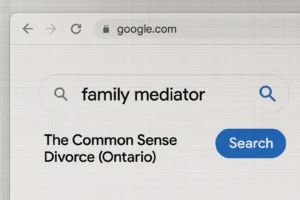You Google, “family mediator near me” and are hit with a barrage of names, faces and offices. How do you choose a good mediator?
When it comes searching, “how to choose a good mediator,” deciding on the right family mediator isn’t just a matter of finding the lowest price or the most convenient location. A good mediator can make a tough time a bit smoother, while the wrong one can leave you frustrated and financially drained. So, let’s dive into what really matters.
Divorce Mediation Is More Than Just The Mediation
Mediation isn’t just about hashing things out in a room and calling it a day. It’s a process, and to actually work, it needs to include more than just talking. Proper financial disclosure and smart money savvy, for example, are critical. If you’re not getting the full picture on what assets, debts, and income are involved, you’re not making informed decisions. And once agreements are reached, they still need to be properly documented and reviewed.
A thorough mediation process includes:
- Full Financial Disclosure: You both need to be transparent, laying out the full financial picture so the settlement is fair and sticks.
- Financial Wisdom: You don’t want to be hit with unseen taxes, mortgage penalties or draconian solutions that are not just financially reasonable.
- Drafting Agreements: Those handshake deals just don’t hold water in court. Make sure your mediator has a process for drafting a legally sound separation agreement, (not just a Memo of Understanding “MOU”) or partnership with a lawyer who does.
- Independent Legal Advice (ILA): At the end of the day, you’ll want a lawyer to review any agreements so you’re both protected. ILA might feel like an added step, but it’s crucial if you want your agreement to stand up long-term. A good mediator knows this and includes it as part of the process.
Don’t Be Fooled by Marketing Sound Bites or Cheap Prices
A good divorce process includes legal, financial, and emotional expertise. You need a plan. You need clarity. And you need a team that knows what the hell they’re doing.
There’s an old truth that still stands: You can have it cheap, fast, or done well… pick two.
Cheap and fast? Sloppy, stressful, and destined to unravel.
Fast and done well? Expect to spend the money accordingly.
Cheap and done well? That’s called a fantasy.
At The Common Sense Divorce, we don’t offer fantasy. We offer real, financially smart and legally-sound divorce solutions that actually hold up. We are UP FRONT about costs, tell you what’s included (and what’s not) and why it’s worth every penny.
See what’s included and compare our process to the rest… View Our Pricing Page Now
Because when it’s your home, your kids, your future… It’s time to invest wisely.
BEFORE YOU HIRE A DIVORCE LAWYER, MEDIATOR, OR GO TO COURT
Gain Confidence, Clarity and a Strategic Plan
Discover Your Next Steps
For ONLY $399
Feeling lost in the maze of separation? Our 90-minute Divorce Discovery Zoom Session cuts through the confusion and will help you make a decision, make a plan and understand your first steps.
SOLO
Solo
Prep & Planning Session
$399
For individuals who have not yet made a decision or need to equip themselves with the right information. The SOLO Discovery Session will answer your questions, explain Ontario Law in simple English and give you the information you need to make your next decisions.
- Guidance before the talk with your spouse
- Understand your rights & options
- Learn how to start the conversation
JOINT
Joint
Prep & Planning Session
$399
For couples seeking a legally smart and financially-savvy divorce. Addressing misconceptions and understanding options together is invaluable. The JOINT Discovery Session will align you and your spouse with facts—not opinions— the first step towards a smarter separation.
- Minimize miscommunication
- Address misconceptions together
- Get on the same financial and legal page
CHOOSE WISDOM
Whether attending solo or jointly as a couple, keep your separation straight-forward, amicable and cost effective.
Get straight talk about the legal and financial realities of divorce in Ontario.
It’s the information you need to make informed decisions.
Move Your Life Forward With WISDOM
Schedule Your Discovery Session Now
1-866-748-6363
A Good Mediator Has Legitimate Google Reviews
Here’s the truth: divorce is personal. Most people don’t want to shout their separation story from the rooftops… so if you’re looking at a mediator with only a handful of reviews, that’s not necessarily a red flag. But no reviews? That’s a problem.
And on the flip side, if every single review is glowing, vague, and sounds like it was written by a PR firm… well, that’s a different kind of red flag.
Real reviews have nuance. They talk about the ups and downs, the challenges, the relief that comes with being heard, understood, and guided through the process. The best reviews aren’t just praise — they’re stories. They mention names, share real experiences, and give you a gut check on what working with that mediator actually feels like.
✅ Do they speak plainly?
✅ Do they handle tough moments with professionalism?
✅ Do people feel respected — even when the divorce itself was difficult?
That’s what you want to see.
Richmond Hill ON👉 Check Out Our Real Google Reviews Here
Markham ON 👉 Check Out Our Real Google Reviews Here
We don’t hide behind marketing fluff — just honest feedback from real people who’ve been where you are.
Because when you’re choosing a mediator, trust matters. And the people who’ve walked this road before you? Their stories are the ones worth listening to.

How to Find a Good Mediator: Check Their Actual Digital Background
Anyone can be anything on the internet. A mediator’s background and years of experience says a lot about what they bring to the table. If they have years of experience and proven expertise in family law or finance, they’re likely better prepared to navigate the specifics of your family’s divorce, assets, and debts. Make sure they’re trained in the right areas for your needs—weekend certifications don’t cut it when it’s your family’s future on the line.
- Are the mediators in good standing with The Ontario Association for Family Mediation?
- How long have they actually been practicing? Check their historic websites and actual digital Google presence on the Wayback Machine? If they are actually established they will have a notable digital history of at least a decade.
- Who is their team? Are they a one man show or do they bring a roster of expertise? Check the mediator’s “About us” page and see who actually works with them.
- How many clients do they assist annually? You will want someone that works with more than a handful of mediations per year. Ask them straight up!
The Unofficial Rules of Divorce:
Divorce gets prickly, even in the most amicable situation
It’s often less about the legalities and more about the money
People make expensive mistakes because they don’t make a plan
Before you do anything, understand your rights, obligations & complexities
I'm researching Separation
My Separation is imminent
I'm beginning a Divorce
Communication Style is Everything
Your mediator should be a skilled communicator. You’re paying them to keep the conversation constructive, not to make you feel like you’re in high school detention.
Do they listen? Do they have that knack for putting both parties at ease without taking sides? Watch how they speak, not only to you but to everyone in the room. If they’re dismissive or show favoritism, thank them for their time and move on.
Get a Gut Check on Their Personality
This one’s huge. You’ll be spending hours with this person, so it’s vital that you actually like them. You don’t need to be friends, but you do need to trust them and feel safe airing your dirty laundry with them. If they come off as cold, distant, or uninterested, keep looking.
How To Choose a Good Mediator? Ethics Matter (A Lot)
You need to trust that your mediator has integrity and won’t cut corners just to wrap things up. They should be transparent about costs, the process, and what’s realistic. If something feels off, trust your gut. This isn’t the time for compromises on ethics.
In-Person or Online Mediation?
Online Mediation has come a long way, and you no longer need to be in the same room to make progress. Both in-person and online mediation have their perks, so let’s break it down and figure out what’s best for you.
Mediation works both in-person and online, and the right choice depends on your needs. In-person offers personal connection and accountability, while online brings time and location flexibility, reduced stress, and broader access to some of the best services available across the province.
Whether you value face-to-face interaction or the convenience of logging in from home or the office, pick what fits your life and focus on reaching a fair, lasting agreement.
Are They Patient, But Not a Pushover?
A mediator’s job is to keep both parties on track. They should be patient, yes, but also assertive enough to keep you both accountable without letting one person dominate. If they’re letting things drag out or one side steamrolls the other, they’re not doing their job.
Bottom Line: Take Your Time
Finding a good family mediator is a process, not a quick decision. A bit of research now can save you a lot of money and heartache later.
Think about what matters to you—experience, communication style, ethics—and take your time. A good mediator will offer not just a conversation but a complete process that includes everything you’ll need to make your agreement strong, fair, and lasting. Don’t settle for less than what you deserve.
